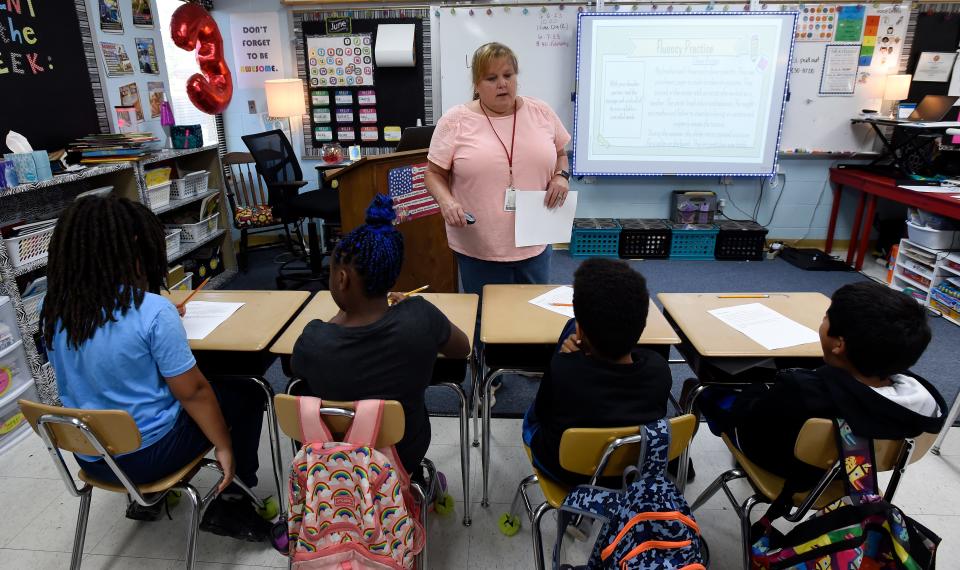Can Tennessee afford to replace federal education funds? Yes, but with caveats, report finds
Can Tennessee afford to replace the billions in federal education funding some Republicans want to give up?
Yes, but there are many unknowns still, including the impact on safety net protections in the event of a major economic downturn, according to a new report by the Sycamore Institute, a nonprofit Tennessee think tank.
Foregoing the funding also won't eliminate all of federal oversight requirements state schools must currently adhere to, and the state would likely draw lawsuits to clarify ongoing protections for students with disabilities and other student groups.
'Just listen': Why disability advocates are warily eyeing federal education funding debate
The report comes as a legislative working group prepares to meet in Nashville next week to determine whether the state can reject the funding and recommend a strategy for how to do so before the January legislative session.
The new research indicates Tennessee is looking at forgoing around $1.1 billion, the majority of which funds programs for school meals, students with disabilities and low-income students. Overall, Tennessee has received more than $10.4 billion in federal education funding since 2023, per a Department of Education report prepared in February, though that total includes unusual pandemic-related funding.

The Sycamore report estimates Tennessee has about $2.2 billion in recurring revenues that could cover a $1.1 billion budget hole while also funding other routine cost increases.
But a years-long stream of budget surpluses in the state is now slowing, revenues are falling under projected totals and Tennessee's elected officials are prepping for a significantly tighter budget next year.
Replacing federal funds with state resources would drain the recurring revenue bucket that could be put toward more pressing needs if revenues continue to fall, the Sycamore report noted, and it's unclear if Tennessee could tap back into federal resources easily in the event of a major recession.
Federal education funding has previously ballooned during poor economic periods.
"It is unclear if Tennessee would still get federal education aid to weather recessions and how quickly the state could reverse course if policymakers changed their minds," the Sycamore report states.
"If Tennessee rejected federal K-12 dollars, it’s not clear if the state could access education funds during recessions, when supplemental dollars are often made available. During and after the Great Recession, for example, TDOE’s federal revenues grew to $1.5 billion and 30% of the department’s budget. This was a critical resource for plugging holes in the state budget during and after the Great Recession. These amounts were even greater during and after the COVID-19 pandemic."
The idea has been floated and backed by Republicans such as House Speaker Cameron Sexton, R-Crossville, who has decried oversight into things like state testing. Gov. Bill Lee has said he is "interested" in what the working group comes up with, though Lee has sidestepped questions about specific areas of "overreach" he takes issue with.
Meanwhile, Democrats and education advocates, including members of the disability community, have expressed alarm over losing potential federal protection and confusion about the fiscal responsibility of leaving education funding on the table.
Federal Education Funding Working Group
∎ Monday, Nov. 6 at 2 p.m.
∎ Tuesday, Nov. 7 from 9 a.m. to 11 a.m. and 1 p.m. to 3 p.m.
∎ Wednesday, Nov. 8 from 9 a.m. to 11 a.m.
∎ Tuesday, Nov. 14 from 9 a.m. to 11 a.m.
∎ Wednesday, Nov. 15 from 9 a.m. to 11 a.m. and 1 p.m. to 3 p.m.
All meetings are scheduled to take place at the Senate Hearing Room in the Cordell Hull State Office Building located at 425 Rep. John Lewis Way N in Nashville.
This article originally appeared on Nashville Tennessean: Tennessee Republicans consider slashing K-12 education budget

